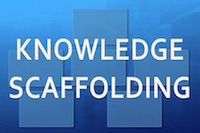Conversational Agents Improve Peer Learning through Building on Prior Knowledge
 Research in computer-supported collaborative learning has indicated that conversational agents can be pedagogically beneficial when used to scaffold students’ online discussions. In this study, we investigate the impact of an agile conversational agent that triggers student dialogue by making interventions based on the academically productive talk framework. An experimental activity in the context of a university course involved 72 undergraduate students who discussed online in dyads. Two conditions were compared: (a) dyads who received agent interventions while working on a learning task (treatment) and (b) dyads who worked on the same task without any agent interference (control). Utilizing a concept map created by the course instructor, the conversational agent delivered unsolicited interventions that encouraged treatment students to build on their prior knowledge, linking their current contributions to the main domain principles discussed during the course. Study findings indicate that the agent intervention mode substantially improved both individual and group learning outcomes. Evidence suggests that the agent effect on learning performance was mediated by students’ explicit reasoning, which was also found to be enhanced in the treatment condition.
Research in computer-supported collaborative learning has indicated that conversational agents can be pedagogically beneficial when used to scaffold students’ online discussions. In this study, we investigate the impact of an agile conversational agent that triggers student dialogue by making interventions based on the academically productive talk framework. An experimental activity in the context of a university course involved 72 undergraduate students who discussed online in dyads. Two conditions were compared: (a) dyads who received agent interventions while working on a learning task (treatment) and (b) dyads who worked on the same task without any agent interference (control). Utilizing a concept map created by the course instructor, the conversational agent delivered unsolicited interventions that encouraged treatment students to build on their prior knowledge, linking their current contributions to the main domain principles discussed during the course. Study findings indicate that the agent intervention mode substantially improved both individual and group learning outcomes. Evidence suggests that the agent effect on learning performance was mediated by students’ explicit reasoning, which was also found to be enhanced in the treatment condition.







